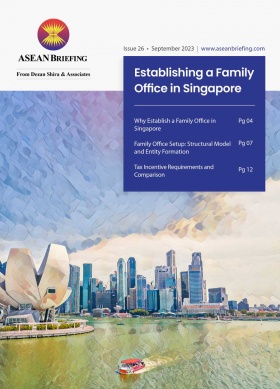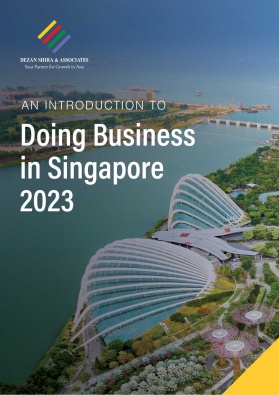Singapore to Amend Free Trade Zones Act, Strengthening Powers to Tackle Illegal Trade
The Singapore Parliament has tabled a bill to make amendments to the Free Trade Zones (FTZ) Act of 1966 and “make consequential amendments” to the Customs Act of 1960.
The Free Trade Zones (Amendment) Bill (FTZ Amendment Bill), which was read the first time on September 18, 2023 and second time on October 4, 2023, seeks to address concerns over the exploitation of the country’s FTZs for illicit activity by strengthening the licensing regime, regulations, and law enforcement in the FTZ Act.
The Bill will be implemented from the beginning of 2024, and affected companies and individuals will be given a six-month period to comply with the new requirements.
Singapore is home to the world’s second busiest container port and largest transshipment hub. Its strategic location on the edge of the Strait of Malacca combined with its business-friendly and low-tax environment makes it a magnet for foreign investors and companies, in particular those operating in international trade. The nation currently has 10 FTZs, mostly located in port areas, which capitalize on its advantageous position to further facilitate international trade.
Amendments to the FTZ Act
At the second reading of the FTZ Amendment Bill on October 4, Senior Minister of State for Finance Chee Hong Tat cited growing concerns that FTZs around the world are being exploited for illicit activity, “such as weapons proliferation, environmental crimes and trade-based money laundering”. By falsifying cargo manifest data and switching legitimate goods for contraband before re-exporting, illegal actors exploit FTZs to “disguise their actions as legitimate trade”.
Businesses operating in the FTZs can enjoy a variety of advantages and preferential treatment designed to facilitate seamless trade and logistics operations. These include the suspension of customs duties and taxes on goods, simplified customs procedures, efficient logistics and transportation services, and access to global markets thanks to Singapore’s extensive network of free-trade agreements (FTAs), investment guarantee agreements, and Double Taxation Avoidance Agreements (DTAAs).
According to Chee, Singapore Customs has already been taking measures to prevent criminal activity taking place in the FTZs by conducting surprise inspections on businesses and sharing actionable intelligence with both local and international partners.
To this end, Chee said that the FTZ Amendment Bill will make three key changes to the FTZ Act, which we outline below.
New licensing regime for FTZ operators
The FTZ Amendment Bill introduces a new licensing regime for companies operating in the FTZs, in order to “specify and enforce the necessary requirements to ensure the overall security of our FTZs, and improve our regulation of the flow of goods and persons within the FTZ”.
Under the new regime, FTZ operators, defined as “the person who administers, maintains and operates the free trade zone”, must meet a variety of conditions in order to receive a license. These conditions include implementing various security structures, such as CCTV cameras and fences, assisting Customs officers in the execution of their duties, and to nominate and provide the contact information of a representative of the FTZ operator to Customs.
The licensing requirements in effect place some of the burden of responsibility for monitoring and preventing illegal activity within the FTZ onto FTZ operators.
For instance, FTZ operators will be required to “take reasonable measures to assess whether any person who intends to carry out any activities […] in the free trade zone […] falls within any list of prohibited persons”, and to refuse to grant permissions to such persons to enter or reside in the FTZ.
In addition, FTZ operators will be required to “report and disclose relevant information on suspicious or dangerous goods or persons within the FTZs to the Director-General of Customs”.
Many of these requirements have already been implemented by Singapore Customs on the ground, but had until now not been formalized in any legislation.
In the past, Singapore’s FTZs were operated by public bodies, but are now mostly operated by private companies due to privatization. The licensing regime seeks to address this shift by implementing a “fit-for-purpose” system that ensures operators are compliant with relevant regulations.
New regulations on cargo handlers and agents
While cargo handlers, shipping agents, and air cargo agents are not subject to the licensing regime, the FTZ Amendment Bill strengthens regulations surrounding the duties and responsibilities.
A “cargo handler” is defined as “a person providing any service or facility for the storing, processing or handling of goods at the free trade zone, for any goods being brought into or out of Singapore”. An FTZ operator can also be a cargo handler if it engages in this activity.
A “shipping agent” or “air cargo agent” is “a person who carries on a business that includes handling goods, to be passed or received from an operator of a vessel [or aircraft] or its representative, for carriage in the vessel [or aircraft]”.
Under the amended FTZ Act, cargo handlers and agents will be required to comply with orders from the Director-General to provide information relating to the management and movement of goods in the FTZ, implement security systems and procedures, and provide information on any goods that could be dangerous or harmful, or break any laws.
Shipping and air cargo agents will also be required to provide specified information contained in a Bill of Lading or Airway Bill to the cargo handler before the goods enter or are transshipped through Singapore. According to Chee, this amendment means that information on all transshipment goods must now be submitted as part of the permit application process. Previously, only information on import and export goods, as well as controlled goods that are transshipped, had to be submitted.
The new section 14N requires any prescribed shipping agent, air cargo agent, and any shipping agent and air cargo agent within any prescrived class of shipping agents and air cargo agents, to give specified information contained in a bill of lading or airway bill (as the case may be) for goods that are brought into or intended to be brought nto, or brought out of or intended to be brought out of, a free trade zone, to the FTZ cargo handler providing handling services for those goods in the free trade zone. – FTZ Amendment Bill
Failure to comply with any of these new requirements may result in a fine of between SGD 5,000 and SGD 10,000 (US$3,683 to US$7,366) or a prison term of up to 12 months.
These changes aim to give Singapore Customs “better visibility of goods that are being transshipped through Singapore before arriving at their final destination”, per Senior Minister Chee.
Strengthening enforcement powers of the Director-General and Customs officers
The FTZ Amendment Bill seeks to strengthen enforcement of the law by expanding the powers of the Director-General and customs officers.
Under the amended FTZ Act, the Director-General may suspend or revoke an FTZ operator license without compensation if the FTZ operator is found to not meet the conditions of the license or otherwise violate their obligations.
The Director-General may also censure the FTZ operator holding a license in writing, modify or impose new conditions on the license, or direct the FTZ operator to do or refrain from doing certain things to rectify a violation.
In addition, the customs officers have the power to do any of the following:
- Enter an FTZ to monitor compliance;
- Search an FTZ for anything, carry out inspections, take photographs, make video or audio recordings, inspect goods and documents, and so on;
- Detain goods for inspection;
- Require goods to be brought to an examination station for inspection;
- Arrest any person that has been found to commit, attempt to commit, or aid in the committing of an offense without warrant; and
- Require persons to provide information and documents.
According to Chee, these powers “are necessary to allow Customs as the FTZ regulator to ensure the compliance of FTZ operators, cargo handlers, cargo agents and other entities and persons operating within the FTZs”.
Impact on companies in Singapore’s FTZs
Companies operating within the law in the FTZs will not be strongly affected by the changes, as the amendment mostly seeks to tackle criminal activity and applies only to FTZ operators, cargo handlers, and agents. As stated by Senior Minister Chee during the second reading, “The amendments in this Bill are targeted at [bad actors], while keeping a business-friendly operating environment for genuine users”.
Senior Minister Chee also emphasized that the amendments have been made “in consultation with industry and relevant stakeholders” in order to ensure that they are in keeping with Singapore’s pro-business environment. The changes are also “in line with international best practices, including those established by the World Customs Organisation”.
However, the FTZ operating companies, cargo agencies, and cargo handlers will be subject to a higher bar for compliance as the changes now formalize their responsibilities to detect and prevent illegal activity. In addition, between the increased powers of customs officers to conduct spot checks and the new licensing requirements, these operators may experience more operational and administrative complexity.
From a broader standpoint, the amendments will help to further bolster Singapore’s reputation as a world-leading trade and transshipment hub, and improve confidence and trust in the industry’s legitimacy. As Senior Minister Chee said, “Companies that do legitimate trade through Singapore will benefit from a sound, reputable and pro-business regime. In turn, Singapore continues to remain competitive as the top port-of-call for transshipments, and a trusted global trading hub.”
About Us
ASEAN Briefing is produced by Dezan Shira & Associates. The firm assists foreign investors throughout Asia and maintains offices throughout ASEAN, including in Singapore, Hanoi, Ho Chi Minh City, and Da Nang in Vietnam, Munich, and Esen in Germany, Boston, and Salt Lake City in the United States, Milan, Conegliano, and Udine in Italy, in addition to Jakarta, and Batam in Indonesia. We also have partner firms in Malaysia, Bangladesh, the Philippines, and Thailand as well as our practices in China and India. Please contact us at asia@dezshira.com or visit our website at www.dezshira.com.







